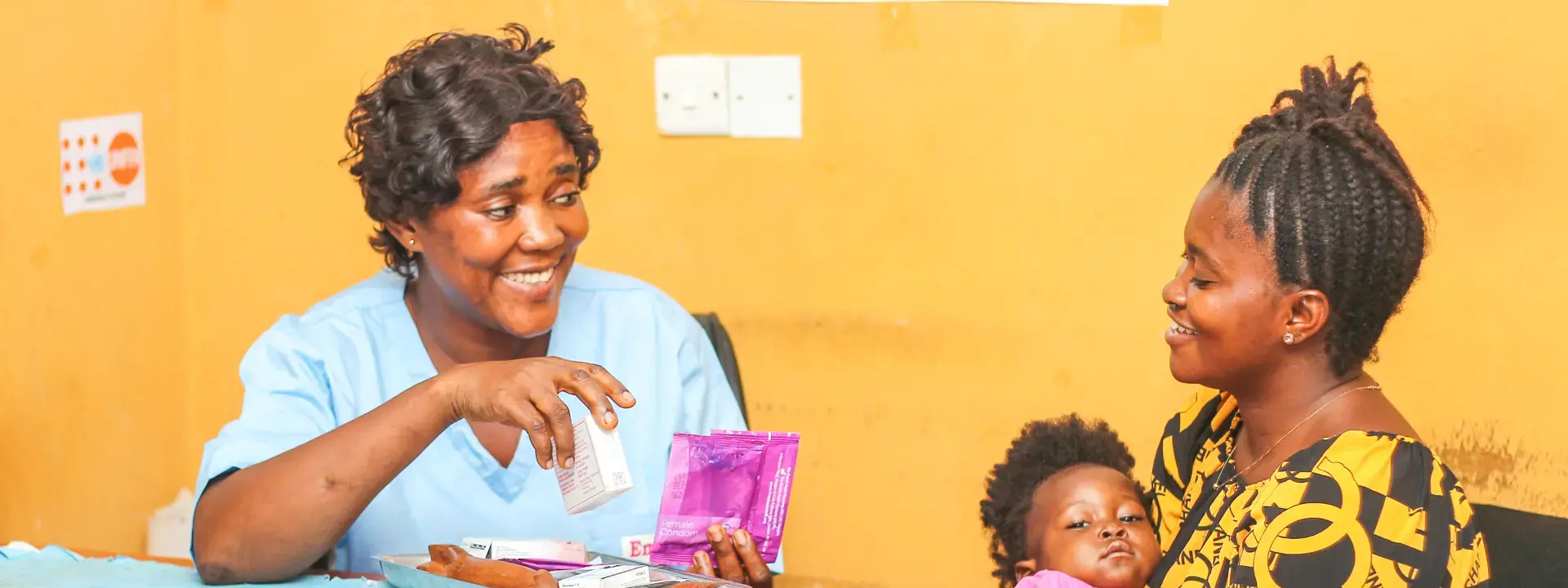Family planning
Improving access to family planning helps women and couples achieve their desired family size, reduces unintended and high risk pregnancies, increases birth intervals and improves child health outcomes. Family planning also improves quality of life and increases economic growth. In Sierra Leone, there has been a steady decline over time in the average number of children that a woman bears in her lifetime. On average, in 2008 women had 5.1 children, 4.9 children in 2013 and 4.2 children in 2019. The percentage of teenagers (15–19) who have given birth or are pregnant with their first child decreased from 28 per cent in 2013 to 21 per cent in 2019.
Early childbearing is still common in Sierra Leone and in 2019, the median age at first birth among women aged 25–49 was 19.5 years. Twenty-five per cent of women and girls of reproductive age who want to plan their families do not have access to modern family planning services. The proportion of demand satisfied for family planning remains low at 46 per cent.
Strengthening national systems for commodity security
UNFPA’s family planning support focuses primarily on getting quality assured contraceptives, commodities and life-saving maternal health drugs to women and girls and strengthening the systems to make this happen. In 2020, UNFPA provided substantive technical assistance in strengthening the existing national coordination platforms for family planning and commodity security with funds from the UNFPA Supplies Programme. A notable result of this is the enhanced capacity of the Government to manage processes for the determination of reproductive health commodities needs, with participation of key national and subnational stakeholders using up-to-date data. This resulted in multiyear forecasts and a comprehensive supply plan, which served to secure funding and place procurement orders in advance. Such an intervention was even more critical in the context of the global pandemic which was characterized by global supply chain disruptions and extended lead times.
In July 2020, the MoHS directed the National Medical Supplies Agency to take over the procurement, warehousing and distribution of drugs and medical supplies. With funding from UK aid through the Saving Lives in Sierra Leone programme, UNFPA provided technical support to the Ministry in the development of the first phase of a National Integrated Health Supply Strategy. The strategy once completed will provide guidance and direction on investments to realize an efficient and sustainable supply chain management system.
Increasing availability and choice of family planning supplies
In 2020, with funding from UNFPA Supplies and UK aid, UNFPA supplied a wide range of quality-assured long-acting, short-term and emergency contraceptives estimated to protect 912,691 couples for a period of one year. The predominant source of modern contraceptive methods in Sierra Leone is the public sector, covering 80 per cent of all users; hence it is the major recipient of these supplies. Planned Parenthood Association of Sierra Leone and Marie Stopes Sierra Leone also received UNFPA-donated contraceptives. These implementing partners employ various channels including private facilities, static clinics and outreach services to reach clients in urban, rural and hard to reach locations. Employing various family planning service channels has the potential to reduce barriers to access.
The contraceptive dynamics in Sierra Leone has significantly changed in recent years. Even though the injectable contraceptive remains the most preferred method, the number of clients using long-acting reversible contraceptives, particularly implants, has shown a dramatic increase. In 2013, 18 per cent of women used implants compared to 34 per cent in 2019. UNFPA supplied two options of implantable contraceptives with varying length of protection, with funding from UNFPA Supplies and UK aid.
In 2020, public sector facility level stock-out rates for all contraceptive methods (except for condoms) remained below 10 per cent. With funding from UNFPA Supplies and UK aid, a total of 435,486 clients were provided with family planning services and information during the year through public health facilities. Among these, 171,851 were new acceptors of which 47,609 (27.7 per cent) were adolescents aged 10 years to 19 years old. These supplies and services are estimated to have averted 159,002 unintended pregnancies, 56,007 unsafe abortions and 1,179 maternal deaths.
Improving visibility and accountability at the last mile
In 2020, UNFPA implemented the last mile assurance process to provide visibility and assurance regarding safeguarding, management and use for intended purpose of UNFPA-donated supplies, after their handover to implementing partners. The ultimate goal of the process is to provide reliable evidence on whether or not supplies effectively reached the designated service delivery points where beneficiaries can access them, often referred to as the last mile. As a result, issues were identified, a remediation plan devised and corrective measures taken to minimize both fraud, misuse and delivery risks.
Ensuring continuity of family planning services during COVID-19
In April 2020, with funding from UK aid, UNFPA supported the Government both financially and technically in an ad-hoc distribution aimed to preposition contraceptives and life-saving maternal health medicines to all district medical stores, one step closer to facilities, as part of the COVID-19 preparedness. The contraceptives distributed were estimated to protect over 117,000 clients. Based on a rapid facility readiness assessment, a total of nine UNFPA-supported hospitals and community health centres were supplied with personal protective equipment to ensure continuity of essential reproductive health services, including family planning.
According to the 2019 SLDHS, 98 per cent of married women and 99 per cent of men knew of at least one modern contraception method. Despite this level of awareness, many tend to harbour misconceptions or possess superficial information about contraceptives issues. In 2020, this situation was further compromised due to COVID-19 as communities got exposed to biased information which discouraged facility visits. In 2020, to address misinformation, UNFPA, with funding from Irish Aid and in partnership with the telecommunications company Africell, created numerous messages on family planning, maternal health, GBV and COVID-19.


